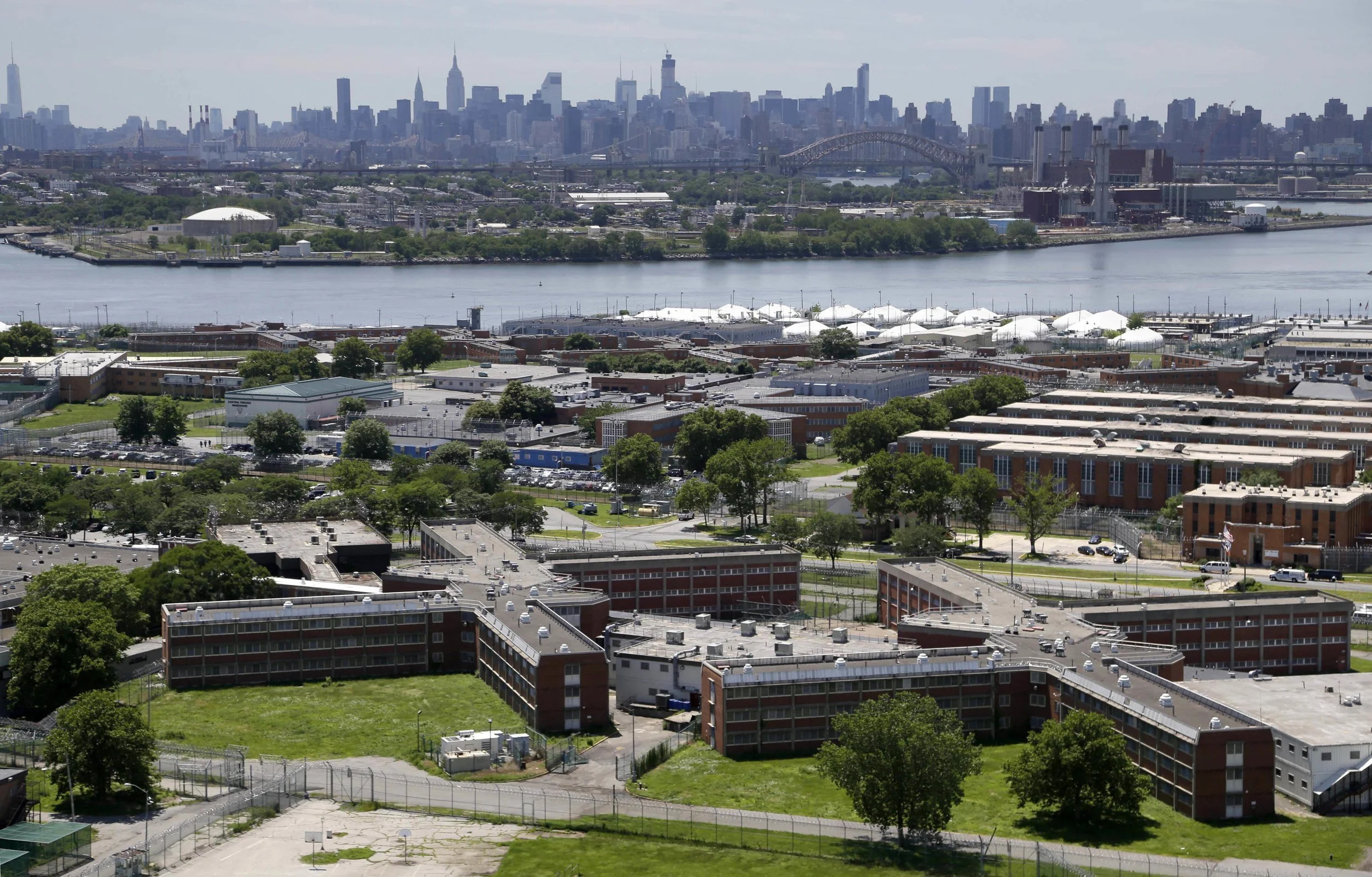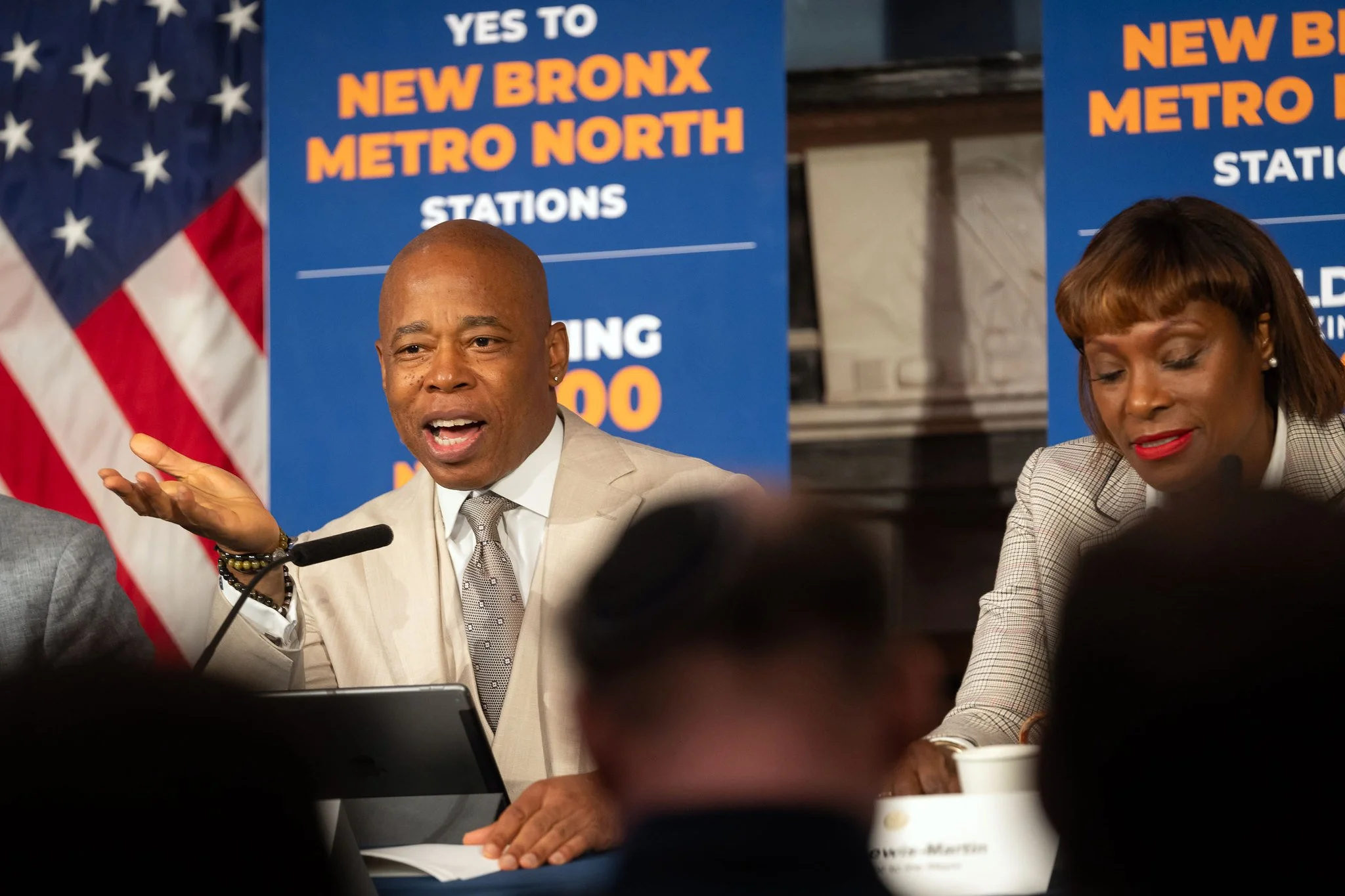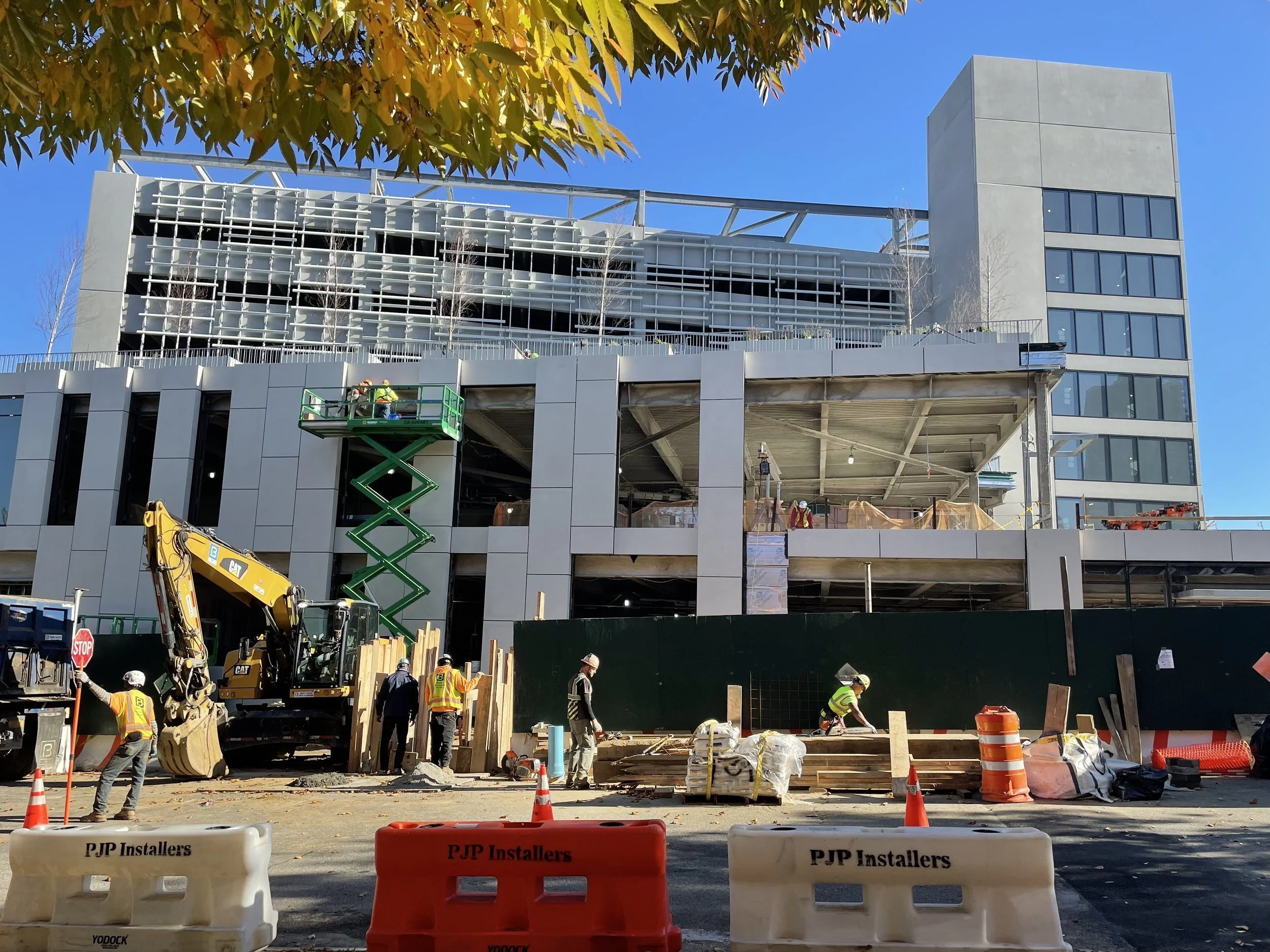The city has three years to close Rikers – can it be done?
/The three-year countdown to the deadline to close Rikers Island as a jail complex begins this week. However, major questions remain unanswered regarding the city’s ability to meet the deadline. AP file photo by Seth Wenig
By Jacob Kaye
In three years, the nearly 100-year history of violence, chaos and death on Rikers Island is supposed to come to an end.
At least, that’s what city law says.
As the three-year countdown to the closure of the jails on Rikers Island begins this week, major questions remain about whether or not the city will – or even can – meet the August 2027 deadline to shutter the notorious complex.
The city is running several years behind the original timeline for the jails’ closure, which was first mapped out in 2017 and passed into law in 2019. It’s also wildly off course of the roadmap to close Rikers created by the Independent Rikers Commission, which the City Council and Mayor Eric Adams re-convened around a year ago so that it could “update and enhance the plan.”
None of Rikers’ replacements – the four borough-based jails in Queens, Brooklyn, Manhattan and the Bronx – are on pace to be completed by 2027. And even if they were to open on time, they’d be too small to hold the ballooning detainee population currently held on Rikers.
Adams, who has never voiced his full-throated support for the original plan, has insisted that his administration will “follow the law” when it comes to jail’s closure. But at the same time, he’s said that he believes the closure deadline will be impossible to meet.
The mayor has yet to articulate just how the city will meet its legal requirement when it comes to Rikers closure. And while Adams has suggested that such a plan will be shared after the re-formed commission issues its recommendations in October, advocates and lawmakers have questioned just how committed the mayor is to shutting down the island as a jail complex.
Still, three years out, those who have long advocated for Rikers’ closure are divided on the question of whether or not the city is too far behind schedule to meet the August 2027 deadline.
Some remain optimistic that the city can kick their work into a higher gear, expedite the construction of the borough-based jails, decrease the incarcerated population and close Rikers on time.
“I think we still have enough time to get it done,” said Darren Mack, the co-director of criminal justice advocacy group Freedom Agenda.
Others say the city has effectively passed a point of no return and that the obstacles standing in the way of the jails’ closure are too vast to overcome by the deadline.
“I don't think we are going to close Rikers by 2027,” City Councilmemebr Sandy Nurse, who chairs the council’s Committee on Criminal Justice, told the Eagle in a recent interview. “We have a long way to go.”
City Councilmember Sandy Nurse, who chairs the council’s Committee on Criminal Justice. File photo by Gerardo Romo/NYC Council Media Unit
Nonetheless, both sides agree on one point – Rikers’ closure rests in the hands of the mayor, who has thus far done little to ensure that the city will meet the 2027 target date.
“It's not clear that we have a willing partner who wants to work with the council, who wants to pull together all the stakeholders that have different parts of the solution,” Nurse said. “Given that kind of environment, I feel we have a lot of work to do.”
Last week, the Eagle asked the mayor’s press office a number of questions about Rikers’ closure, including if City Hall believed the city would be able to close Rikers by the deadline, when the mayor would put forth his plan to close Rikers and if the Adams administration plans to challenge the laws mandating Rikers’ closure in court.
A City Hall spokesperson declined to answer any of the Eagle’s specific questions but said that it had “become painfully clear that the plan approved under the last administration leaves open serious questions about the city's ability to keep New Yorkers safe, and we look forward to reviewing the [Independent Rikers Commission’s] recommendations on how to move this plan forward once they are released.”
“But as Mayor Adams has said repeatedly, this administration will always follow the law, and we remain committed to completing the borough-based jails, which is what we must do to protect public safety, provide humane conditions for those in custody, and close the jails on Rikers Island – there is simply no other path forward,” the spokesperson said.
The path not taken
In late 2022, less than a year into the Adams administration, the Independent Rikers Commission issued a report titled “Halfway to History.”
In it, the commission, which is led by former Chief Judge Jonathan Lippman, detailed how the city could “realize this historic achievement [of closing Rikers] by lowering crime, safely and smartly reducing the jail population.”
The report listed a handful of challenges, most of which were brought on by the pandemic, that stood in the way of the city’s ability to hit the 2027 deadline. It also listed a number of steps the city could take to overcome them.
But two years later, all of the same challenges remain.
Atop the list was the jail’s rising population, which the 2022 report said was “artificially inflated.”
The borough-based jails were originally designed to hold 3,300 detainees, though Adams last year said that they would increase the number of beds so that the jails could together hold 4,160 detainees. Still, the current population on Rikers remains too large.
At the time the report was issued, Rikers’ population hovered around 5,870 detainees on any given day. In May of this year, the latest month data is available, the average daily population on Rikers was around 6,300 detainees.
Overall, the population has grown by around 1,000 detainees since Adams first took office.
The plan to close Rikers Island by 2027 has largely stalled under Mayor Eric Adams. File photo by Ed Reed/Mayoral Photography Office
Advocates have largely blamed the mayor for the jail’s growing numbers, citing an increase in arrests made by the NYPD and cuts he’s made to alternative-to-incarceration and other programs that they say keep people out of jails and prisons.
“[Adams] sees public safety like a hammer, he sees it as a solution to every social problem – mental health, the unhoused, incarceration,” Mack, the co-director of Freedom Agenda, said. “I'm hoping that he sees that he's on the wrong side of history, the wrong side of policy when it comes to addressing these social issues and reverses a lot of the policies that he has proposed or implemented that contributed to the rise of mass incarceration in our city.”
Zachary Katznelson, the executive director of the Independent Rikers Commission, told the Eagle that while population-related issues still exist, he feels the city has begun to make “some progress” toward bringing it down.
Included in this year’s city budget was funding to build additional supportive housing beds for homeless New Yorkers in need of mental health, addiction or other services. The commission estimated in 2022 that around 2,600 people in need of supportive housing cycle in and out of Rikers each year.
Katznelson also celebrated additional funding allocated by the state to expand its mental health courts, which could help divert some of the approximately 3,000 people on Rikers Island with a mental health diagnosis from the criminal justice system and toward treatment.
“I think it's a common goal with everybody – the administration, the council, the courts, everybody – particularly around mental health, understanding that there are a lot of people with serious mental illness that should be in treatment and not in the jails, and trying to build out a system that makes that possible,” he said.
The “Halfway to History” report also said that the city, in 2022, was facing the rising costs of construction, which would impact its ability to pay for the building of the four borough-based jails.
At the time of the report, the commission estimated that the jails would cost $9.9 billion, or around $1 billion more than the original projection. As of this spring, Adams said the price had risen to nearly $16 billion, or double the original projection.
And that price stands to increase as the project’s drag on.
According to construction contracts handed out by the city, the first of the borough-based jails – the one in Brooklyn – isn’t scheduled to be completed until 2029, two years after the closure deadline. Queens’ jail, which will be built in Kew Gardens behind Borough Hall on the site of the former Queens Detention Complex, isn’t scheduled to be completed until 2031, the same year the Bronx facility is scheduled to open. A construction contract for the Manhattan jail has yet to be awarded.
Construction of the parking garage that will one day be connected to Queens’ borough-based jail facility. The jail is not expected to open until 2031, four years after the deadline to close Rikers Island. Eagle file photo by Jacob Kaye
But again, Katznelson remained optimistic that the city would find ways to speed up construction of the projects so that Rikers’ closure could still come in 2027.
“The sooner these jails get built, the sooner we close Rikers,” he said.
The 2022 report also listed the violent conditions on Rikers Island as a challenge affecting the jails’ closure.
“Conditions on Rikers remain dire and must be addressed urgently; operations must be
dramatically reformed as we move towards new borough facilities,” the report read.
About a year after the report was issued, a federal judge began to consider whether or not the city should remain in control of Rikers Island as a result of its alleged inability to tamp down the violent conditions there.
The judge, who has been asked by the Legal Aid Society to install a federal receiver to take over control of Rikers, will hear oral arguments in the ongoing detainee rights case known as Nunez v. the City of New York in September.
The commission, which is currently finalizing its recommendations for Rikers’ closure, is expected to release its updated report in October.
But Nurse says that she worries that regardless of what the report says, Adams may not follow it largely because of the way she says he’s failed to implement the commission’s original recommendations.
“I would hope that receiving a document that lists out some clear recommendations with explanations and well-researched proposals that have input from multiple stakeholders who are experts in what they're doing would be uplifted, looked at seriously and implemented,” Nurse said. “Certainly, I think it would be important for the mayor to support this plan, support this document, and support the recommendations coming out of it but I'm not convinced that that will happen.”
“There are things that [the Adams administration is] out of compliance with, and they have a legal mandate,” Nurse added. “This is a city of laws. This is a mayor who is a law-and-order mayor. You need to respect the laws, and what we've seen is that the mayor picks and chooses what laws he wants to enforce.”
Mack said that he too lacked faith that Adams would get on board with a new plan. However, he believes that Adams’ potential disinterest in Rikers’ closure plan doesn’t mean the effort to shut the jail complex Mack once was detained in is doomed.
“It's hard to trust the administration that is operating in this manner, but we don't really put our trust in the administration – we put our trust in the directly impacted people in our organization pushing this mayor to do the right thing,” Mack said. “We are closer to closing Rikers than ever before.”







